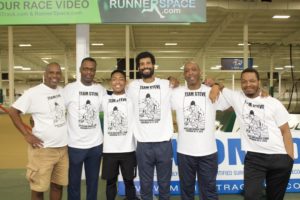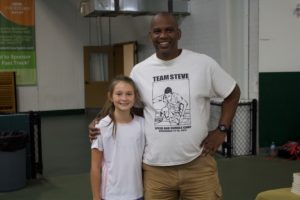Team Steve Camp, the Human Side
by Steve McGill
With everything in life, there is the practical side, the logical side, which is all about getting things done, checking items off the checklist, and staying on task. In addition, there is the human side, the emotional side, which is all about feeling a sense of connection, overcoming fears, and challenging oneself to rise above perceived limits.
[am4show not_have=’g5;’]
[/am4show][am4guest]
[/am4guest][am4show have=’g5;’]
For me, both sides are very real. For the Team Steve Camps that I conduct with fellow coaches Hector Cotto and Kevin Howell, we want our athletes leaving camp feeling empowered to become better hurdlers and equipped to reach any goals they may have. That’s the practical side – improving technique, learning new drills and how to do them properly, improving the block start. That’s the stuff I talk about in the other Team Steve article for this issue of The Hurdle Magazine. For this article, I want to focus on the human side. And the reason is simple: if I didn’t love the hurdles, if it weren’t a passion of mine that brings a sense of wonder and deep peace into my life, there would be no Team Steve camps, and I wouldn’t be coaching at all. First and foremost, hurdling is a joyful experience, and coaching hurdlers is equally joyful, because it gives me the means by which to not only share my knowledge, but to share my love, to share my joy.
As invigorating and thrilling conducting a camp can be, it is also quite exhausting – not just physically, but emotionally. I know going in that these athletes and their parents are hoping for a life-changing experience. Parents are spending money for camp registration, for travel and hotels. Many of the athletes are starving for guidance that they either don’t receive at home or that can help push them to the next level. That’s why, for me, the day before camp feels the same as the day before a big race used to feel. I’m nervous. And I want to be nervous. Because, like I always tell my athletes before races, if you’re not nervous, you’re not ready.
I want to point out two scenarios from this past weekend that stood out to me in regards to this human side of coaching. In the first scenario, I had a parent text me after day one saying that her daughter was feeling really down on herself, believing herself to be “the worst camper there.” The girl in question was actually doing pretty well, but she was feeling a bit intimidated by the really fast girls, most of whom already have college scholarships locked up. So I told the parent I’d talk to her daughter prior to the start of the morning session of day two, and that’s what I did.
I explained to the girl the importance of getting out of your own head, of focusing on getting better, of learning from those who are hurdling all around you instead of being daunted by their talent. I told her a back-in-the-day story explaining how I’d been the same as her my first year in college, but how I learned the necessity of detaching emotionally, of not comparing myself to others, and just focusing on improving on my flaws. You’re not wrong to feel the way you feel, I explained, but you need to move past it, because in races there will be girls beside you who are more talented than you, and you’ll have to be able to deal with it. I then assured her that I’d be keeping a close eye on her for the rest of camp and I’d keep encouraging her. She went on to have a very good day two and left feeling good about herself.
In the second scenario, there was a girl who fell twice while trying to do the popover drill. Of course, nobody laughed at her, because we all know what it’s like to fall, but she was embarrassed. After the second fall, I could see tears in her eyes and I knew it was time to pull her aside. That’s what I did. I took her to a space behind where the drill was set up, grabbed one hurdle, lowered it to its lowest setting, and instructed her, “Just get over one.” I could see that the concept of pushing off the back leg was foreign to her. “You’ve never done this drill before,” I said, “so don’t be hard on yourself. Not everybody picks it up instantly.” I had her go over that one hurdle six or seven times, until she was finally legit pushing, then I asked her if she was ready to rejoin the others. She nodded, somewhat hesitantly, so I told her, “If you can do it here, you can do it there. Just keep pushing off that back leg.”
She rejoined the others and was able to get over all five hurdles with no problem. The first time she did so I got up in her face and told her, “This is what it’s all about for me. Not coaching national champions, not hearing praise from other coaches. This is what it’s all about: watching someone who is afraid move past the fear, watching someone do something she didn’t think she could so. I am so proud of you.” And she was good for the rest of the session.
There were a lot of little moments like that throughout the two days, and the other coaches have similar stories to tell. To a large degree, being a coach is all about putting out fires. You can’t get to the practical stuff if the emotional stuff stands in the way.
On a personal level, the camp served as a sort of mini-reunion. The two other main coaches – Hector Cotto and Kevin Howell – are two of my best friends in the world. The hardest part of moving from the Raleigh area to the Charlotte area five years ago was leaving such friends behind. The only time I see them in person now is when we do these camps. When I was going through the darkest period of my life after one of my former athletes committed suicide six years ago, those two guys were there for me. They’re like brothers to me.
Another highlight was reconnecting with another of my former athletes, Arthur Njemanze. I coached Arthur during my brief year-and-a-half stint at Southeast Raleigh High School. My first year there, he had no intention of sticking with track even though he had run the year before. I’d heard from other kids that he had run the hurdles the before, so I found him in the hallway one day and encouraged him to come out again. It took about a month or so of gentle prodding, but because I was new and came with a good reputation and had established my trustworthiness, he decided to give it a shot.
Unfortunately, he stayed on-and-off injured throughout the season, so he never was able to drop any fast times. But he demonstrated that student-of-the-game mindset that I always look for in my hurdlers. He learned a lot, asked a lot of intelligent questions, and was even able to help me coach the younger hurdlers. The following year, his senior year, was going to be his break-out year. Over the summer, instead of trying to rush back and compete in Junior Olympic meets, he trained with me on the track five days a week. And on his own, he was lifting weights and tightening up his diet. That was a glorious summer, as he and two other hurdlers worked out with me on a regular basis. I had so much fun with those guys. Every workout was intense, and every workout ended with deep conversation about hurdles and life and how it all related.
Then, mid-year of Arthur’s senior year, I was offered a teaching job in the Charlotte area that I couldn’t pass up. In January of that year, I moved, three hours away. Long story short, Arthur fell apart. He ended up being removed from the team due to too many academic absences.
Although we’ve stayed in touch over the past five years, we hadn’t seen each other in person until last weekend’s camp. I’d asked him to come to help out at previous camps, but work schedule issues prevented it. This time he came, and he stayed with me in my hotel room. We stayed up until 1 in the morning Saturday night talking about everything under the sun. Oddly enough, our conversation centered around our mutual love of jazz music, particularly artists like John Coltrane, Sun Ra, and Pharoah Sanders. In the car on the way to the hotel, I was playing Sun Ra on my Spotify, and Arthur asked, “Is that Sun Ra?” I was stunned. “You know Sun Ra?” I asked. And that conversation continued into the night. At the track, both days, Arthur was heavily involved in working with the kids, especially the youngest ones. He demonstrated all the natural instincts and self-confidence that you look for in a coach. Watching him out there with those 11-year-olds, and conversing with him in the hotel room, I just felt so proud of how much he had grown, of how awake and self-aware he was. That was as much of a highlight of the weekend for me as anything else.

The Team Steve Coaching Staff: Myself (Steve McGill), Booker Nunley, Garrison Rountree, Hector Cotto, Kevin Howell, Arthur Njemanze
I also reconnected with Booker Nunley, father of camper Alex Nunley and two of my former athletes (Booker Nunley IV and Malcolm Nunley). Garrison Rountree, another of my former athletes, came and helped, as he did at the third camp last June. Finally, another of my former athletes, Kennedy Thorne, who currently is in her senior year at North Carolina A&T University, came to work as our videographer. That’s another person I hadn’t seen in five years. To have her involved in the camp, but in a role that reflected her current career goals, was really rewarding. It’s like, life goes on, we change, we grow, but we stay together.
For all of the reasons discussed above, Team Steve Speed & Hurdle Camp IV was my favorite of all the ones we’ve done so far. It was a celebration of life, of friendships, through hurdles.
[/am4show]

